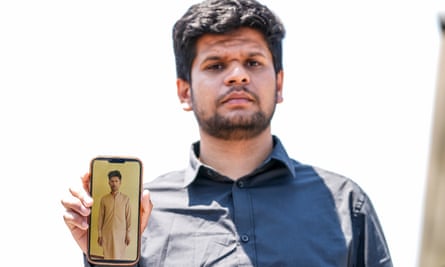[ad_1]
Six days have elapsed since a fishing trawler piloted by people smugglers sank with unimaginable loss of life off Greece and yet they still come: relatives armed with pictures, praying that in the aftermath of the maritime disaster, loved ones are not among the perished. On Monday it was outside the steel gates of a migrant facility in Malakasa, north of Athens, that emotions were on display.
“I have come for a sign of life of my uncle Nadim,” said Zohaib Shamraiz whose first stop was the fenced camp after flying into Greece from Barcelona. “I know for sure he was on the boat because I talked to him five minutes before he boarded. He said there were hundreds on the ship and I told him: ‘Please don’t get on it. Wait for another one.’”
The 21-year-old Pakistani reached Europe with his family as a boy six years ago. Nadim Muhammed, the uncle he had played with as a child in his native Punjab, had wanted to follow suit. “He had three children,” said the soft-spoken trainee taxi driver, with tearful eyes as he showed pictures of Nadim in a traditional shalwar kameez. “He wanted to leave because he was very poor. He worked for $20 a day. Look, this is another picture of him in Libya the night before the ship left.”

Of the estimated 750 men, women and children smugglers are believed to have packed on to the vessel, the vast majority are thought to have hailed from Pakistan. Witness testimonies given to the Greek coastguard suggest that Pakistanis were singled out and “locked” in the hold together with women and children, which is why investigators believe their mortality rates are so much higher. Afghans, Syrians and Egyptians were kept in groups with almost no space to move on the upper deck.
“We now know there were around 400 of our people onboard,” said Shahid Nawab, the head of Greece’s 30,000-strong Pakistani community, emerging from the migrant facility. “Of the 104 survivors, only 12 are from Pakistan and they are in this camp. Of the 78 bodies found so far, most we think are Pakistani.”
Nawab, who reached Greece “when it was so much easier to get to Europe” on Christmas Day 2000, said the 30,000-strong community had rallied to help the survivors. “We have collected clothes and food and we will offer them shelter when they are allowed to leave this camp,” he said. “Our country is in national mourning today.”
Greek migration ministry officials on Monday described survivors as still reeling from the ordeal of the odyssey onboard the Italy-bound ship.
“They’re still shocked and in a very bad psychological state,” said one standing outside the camp’s turnstile entry points.
“They’re sleeping a lot. They’ll leave here once they have gone through the process of applying for asylum.”
The old trawler, repurposed by the Egyptian smuggler network behind the doomed voyage, ran into engine trouble after departing Libya on 9 June. Passengers have told of how they resorted to drinking seawater and their own urine when supplies of fresh water ran out. Others were reported fainting under the hot sun as the engine repeatedly failed and stalled before the ship listed and capsized 47 nautical miles south of Pylos.
A search and rescue operation involving patrol ships and military helicopters was extended at the weekend. Survivors who had been hospitalised, mostly suffering from hyperthermia, are expected to join the 71 other men rescued from the shipwreck in Malakasa this week.
[ad_2]
Source link
